
In December of 2013, a group of 180 people gathered at a Union Square coffee shop in New York City, at sunrise, to welcome the new day with a dance party. From that semi-humble beginning, Daybreaker (www.daybreaker.com), the brainchild of co-founder Radha Agrawal, was born.
A little over a decade later, the Daybreaker movement, which now boasts a global community or more than half a million followers, is not only growing strong, but forging new territories in its mission to bring people together – physically, emotionally, and intellectually. At its core, Daybreaker is about connectedness and community. It’s about putting down our phones, tablets and laptops, and coming together, in person, to celebrate life. If its message and mission was important when the movement started a little over ten years ago, it is absolutely vital today.
On Sunday, April 7, Daybreaker brings its Peace Tour to the Red Rocks Amphitheatre. The combination yoga workout and dance party is scheduled to run from 9:00 am until noon. In advance of the event, I sat down with Radha Agrawal, the CEO, Co-Founder, and Chief Community Architect of Daybreaker, to talk about the movement’s challenges, what participants can expect from the upcoming event in Denver, and what lies ahead for Daybreaker.
Rick: Thank you so much for spending time with me this afternoon, in advance of your early April date for the Daybreaker Peace Tour at Red Rocks. We’re all very excited that Denver is included in the tour.
Radha: Yes, we partnered with the actual Red Rocks organization to do a community day, not just for their citizens, but also for the Red Rocks team. Not only will we have our Daybreaker community there, but there’s also at least one hundred Red Rocks employees and team members who will be there as well, in this beautiful community moment. It’s extra special for us to be able to give back to the Red Rocks team members who are giving so much to their communities.
Rick: We’ll talk more about the upcoming event shortly, but before that I want to talk about something from your book Belong, which was published back in 2018. To this day I get a chuckle every time I think about your suggestion that, for the sake of efficiency, we should brush our teeth in the shower. I will tell you… I’ve done that, and I think it’s awesome.
Radha: I know, you know… a productivity hack. But no, I really love the ritual of the bathroom… it’s probably the Japanese woman in me. So many of our rituals happen in the bathroom, right? It’s like, of course, the ritual of bathing and the ritual of going to the toilet itself. There are so many parts of the bathroom experience that I feel are not fully activated in the American culture that we could talk about for days. Anyway, I digress.
 Rick: Wow… I did not see that coming! Let’s take a step back and talk a little bit about Daybreaker in general before we get into the specifics of the event coming up in April. The message that comes from Daybreaker was very vital when you kicked it off back in 2013. But I think it’s gotten even more so since then. Between the aftereffects of COVID, and the continually escalating divisiveness in our society both politically and socially, and our continued fascination with and reliance upon technology, I’m very concerned that the whole concept of community is getting chipped away at. Do you ever come to a point where you think you’re fighting a losing battle?
Rick: Wow… I did not see that coming! Let’s take a step back and talk a little bit about Daybreaker in general before we get into the specifics of the event coming up in April. The message that comes from Daybreaker was very vital when you kicked it off back in 2013. But I think it’s gotten even more so since then. Between the aftereffects of COVID, and the continually escalating divisiveness in our society both politically and socially, and our continued fascination with and reliance upon technology, I’m very concerned that the whole concept of community is getting chipped away at. Do you ever come to a point where you think you’re fighting a losing battle?
Radha: Oh no, I don’t feel that way at all. I always see the future as an optimistic opportunity. I’m just not built to see it the other way. Recently I was with my friend Lynne Twist. She founded the Pachamama Alliance, worked with the Hunger Project, and is a celebrated philanthropist… you should check her out. We were talking about the environment, and I was like, we can look at the environment through the lens of how most people look at it – doom and gloom, shame and blame, the future is bleak, we’re all going to melt, and we’re going to become extinct as a human species. Or we can look at climate through the lens of possibility and abundance and a future where we’re optimistic that we can actually reduce our carbon footprint.
Technology and social media were built to connect, not to separate. The team at Facebook weren’t trying to create a compare and despair type experience, where you compare yourself to everyone else, based on number of likes and friends. All of that was never meant to be a marker of your social status.
It could be true that the road to hell is paved with good intentions. But we’re learning very quickly about the negative sides and side effects of what’s happening in social media. I really do believe there’s a huge movement of technologists who are trying to do the right thing.
I just launched a free masterclass where I have 120 community builders, who are investing six weeks of their time learning how to build communities. These are all professionals from across the board all around the world who are raising their hands saying I want to invest time and money in learning how to build a community. When I close my eyes, I think about these 120 community builders, and the communities they’re building behind them. If 120 community builders are raising their hands, and they’re building communities of their own, and these communities are building communities of their own, think about the ripple effect. That’s hundreds of thousands of people. I really do believe that there is this kind of divergent path, with those who are deeply wanting to connect, and those who are so traumatized… they just don’t really know how to until we give them tools to come and merge into this connective path. Humans are built for social connection. We are born from another human, and we are spectacularly social creatures. We cannot survive without human connections. And I do believe the pendulum is very quickly going to swing to the other way, in service of deep relatedness and connection.
Rick: I’m with you on all that, but sometimes I get so worried that now that we’ve shown we can be effective working in isolation, it’s become our conscious decision to remain in isolation. When workplaces began opening back up in 2021, massive numbers of people decided they simply did not want to return to offices. They feel that they can do just as well, if not better, working without actual human contact. That frightens me.
 Radha: Yeah, so I have so many things to share about that. There’s a lot of science out there today that speaks to the importance of social connection. But we haven’t done a good job of marketing the topic. The world of fitness, and the world of nutrition, have done a fantastic job of sharing how you cannot live long and healthy lives without good healthy habits, what you’re eating and putting inside your body and your fitness regimen. Well, we’re working on that right now.
Radha: Yeah, so I have so many things to share about that. There’s a lot of science out there today that speaks to the importance of social connection. But we haven’t done a good job of marketing the topic. The world of fitness, and the world of nutrition, have done a fantastic job of sharing how you cannot live long and healthy lives without good healthy habits, what you’re eating and putting inside your body and your fitness regimen. Well, we’re working on that right now.
Daybreaker is involved in a comprehensive study with the UC Berkeley Greater Good Science Center. This is a study on the science of the collective effervescence of dance, being conducted across the world. We’re coming out with it in 2026. Our goal is to begin putting community events and relationships – a sort of communal type of hygiene if you will – in the same category as nutrition and fitness. I think if everyone began to see that they need to bucket relationships and being socially connected in the same category as fitness and nutrition, then going back to a workplace would become more attractive.
I’ve seen many CEOs who have said that if you don’t come and work out of the office, you’re fired. That’s not the way to do it. Humans are autonomous creatures, we love our independence, right? We love being our own bosses. We have to incentivize with the right story backed with the right research.
What I would say to everyone who is comfortable at home, is that you are not getting oxytocin, you’re not getting serotonin, you’re not getting all the juicy, happy neuro chemicals that you need to be a happy person. When you’re invited to join a team back in an office environment that has a fridge full of yummy food, an opportunity to go to lunch with coworkers, a way to be integrated into a social environment, that sounds a lot more fun and exciting.
Rick: I’m 100% locked into everything you just said there, and I hope you’re right about the pendulum swinging back in the other direction. It just seems that a lot of people either don’t know what they’re missing when they live and work in isolation, or they’ve decided it’s just not worth the time and energy to hassle with going back to offices.
Radha: We’ve been living with so many different systems – financial systems, advertising systems, government systems – pushing us towards living a toxic, individualistic life. That’s because it actually is better for profits. If you’re alone, you tend to buy a lot more things that you’re not sharing, right? We’ve been guided to work on me, me, me. There’s this sort of forgetting of the WE. The ME versus the WE. Dr. Dan Siegel talks about this in his book IntraConnected, where he talks about the connection between ME and WE that he calls MWe. There’s this gorgeous dance between the ME and the WE in which we feel the most joyful and connected.
There’s a lot of focus on self-help and personal development, but we can get so lost in doing that, forgetting that the whole point is to better relate to other people. We’re just on this kind of hamster wheel of reading every personal development book we can find. And we get trapped, right?
But I really believe there’s consciousness awakening going on now. We’ve come to realize that COVID was this kind of transitional moment that put us in a toxic, individualistic, loneliness prison. I’m seeing a lot more curiosity, and a lot more interest from so many people who want to learn how to be community builders.
 Rick: I could talk about this with you all afternoon, but out of respect for your time, I need to shift our focus to the upcoming event in Denver. You’re bringing the Peace Tour to Red Rocks on Sunday, April 7, from 9:00 am until noon. For the benefit of people who might not know what a Daybreaker event is like, tell us what they should expect, and why they should attend.
Rick: I could talk about this with you all afternoon, but out of respect for your time, I need to shift our focus to the upcoming event in Denver. You’re bringing the Peace Tour to Red Rocks on Sunday, April 7, from 9:00 am until noon. For the benefit of people who might not know what a Daybreaker event is like, tell us what they should expect, and why they should attend.
Radha: So, this is how I like to think of it. It’s a joyful energy burst to start your day. It’s a three-hour community experience that is infused with a movement practice, a dance party, and a beautiful moment of connection with everyone that’s there with you. You can dance your heart out, burn calories, stretch, and move your body in one of the most beautiful venues in the world. You connect with one another and share intentions for how you want to lead the rest of your day, the rest of your month, the rest of your year. I think of these events as substance free pilgrimages where you share beautiful moments with a community.
There is no reason to be there except to celebrate life, yourself, each other, and self-expression, to be able to move and dance with reckless abandon, to be in the fresh air under the sun. Typically dance parties happen at night, but you’re gonna be dancing under the sun with a circadian rhythm on your side. And you’ll be treated to healthy beverages and food.
The idea is that you’re with new friends, old friends, colleagues, co-workers, your family, or your love or just anybody in your life. It’s a three-hour kind of mini festival experience, where you get to come and just be fully yourself. With the nightlife experience, you can often escape yourself, rather than come home to yourself. So Daybreaker really is the substance free dance party and community experience that lets you fully find yourself again.
It starts with a one-hour yoga practice with breath work and a live musical instrumentation experience, followed by a two-hour dance party. And this is not just a dance party with a DJ. We have a horn section and breakdancers. We have big, stilted animals walking around and bubble machines. I already mentioned healthy beverages and bites that you can just grab and go. And then we close with what we call a secret concert. We wind down the dance party and bring on this beautiful singer songwriter. Now you’re ready to take all this emotional lyricism into your heart, and maybe begin to heal something that’s hurt, that’s hurting you, or forgive someone who’s hurt you.
And then we end with an intention reading, where we all read a poem out loud. Imagine a thousand people reading a beautiful poem about peace out loud together. It’s an opportunity for everyone to share their voices. Then we close the event, and you walk away with this beautiful poem that you get to keep as a totem. In this digital world, we actually hand out postcards with this quote or intention on it, that you get to take with you, to put in your bathroom, or on your fridge, or even to give to someone who needs it.
It’s a three-hour experience that’s hard to explain. You really need to just be there.
Oh, by the way, it’s the Peace Tour, which is the theme this year. When I designed this tour with my team, we were looking at what’s happening in the world. And we’re like, there’s so many wars, and there’s so much war within our own selves. We’re not only hoping for peace in the Middle East and Ukraine and Russia, but also to find peace ourselves. We’re suggesting dressing in all white as a sign of peace. We’re actually going to release white doves in Miami to kick off the Peace Tour.
 Rick: I understand that later in the year you will be transitioning from the Peace Tour to the Purple Tour. Tell us a little bit about that.
Rick: I understand that later in the year you will be transitioning from the Peace Tour to the Purple Tour. Tell us a little bit about that.
Radha: We do two tours each year, and the Purple Tour is our second tour for this year. It begins in July, to run during the election cycle.
I’m Canadian American. I became an American citizen when I was twenty-five. I really feel proud to be American. America gave me everything – my family, my daughter, my business, my community. I owe this country a lot. But I think so many citizens who are born here, you know, maybe forget what it means to be an American. And so, on this Purple Tour, we want to remind Americans that even though we have some differences in our political views, so many of our values are Purple. We share family values, we share the value of music, the outdoors. Let’s bring the Blue and Red together and have a dance party where we bring all communities together to dance for unity and community.
Rick: That’s an inspirational and timely sentiment, Radha. I want to thank you so much for spending time with me this afternoon. As one of the “Master Citizens” you talk about in book Belong, I also want to thank you for the important work you are doing through the Daybreaker movement.
Radha: Thank you, Rick, I really appreciate it. If I could, I’d like to end with one final share. We just launched our nonprofit venture earlier this year. It’s called the Belong Institute, and our mission is to end loneliness and build a culture of belonging. I just want to plug that and share that I’m really proud of launching it this year.
Rick: Thanks for sharing that, Radha. Be well, travel safely, and we will see you at Red Rocks in just under six weeks.
By all accounts, participating in a Daybreaker event can be life altering. The event itself is an important first step in accepting a new reality… that despite constant messaging to the contrary, the true value of life is found in the interactions we have with other living, breathing human beings. But again, it is just a first step. Once you have joined the Daybreaker community, you are armed with the means to continually enhance your life experience through ongoing involvement and engagement. If you’re ready to take that first step, sign up for tickets to the Denver event at www.daybreaker.com/event/peacetour-den. As I understand it, this link is for a ticket opportunity sign up, with actual ticketing to follow.
Story by Rick Witt www.rickwittphotography.com













